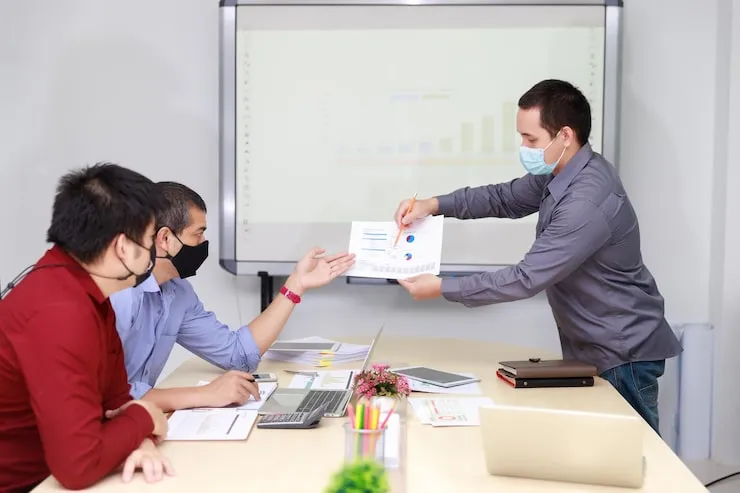
There’s no shortage of theories and frameworks being passed around by people who’ve never managed a high-pressure operation. That’s not what we do.
We work with leadership teams who already know there’s a problem. The culture is slipping. The systems are bending. The teams are spinning their wheels. And the next disruption might be the final straw.
What we bring to the table is simple: Organizational Resilience Consulting is built to withstand pressure, absorb shocks, and keep your business operational when others fold.
Whether you’re a COO of a financial services firm struggling with cross-functional misalignment, or the HR lead of a healthcare network watching morale nosedive, we come in to solve the right problems and get your business hardened against what’s coming.
Our Services
This is what it looks like when someone fixes the operational fragility. We’ve built our approach from the ground up to do one thing: identify where you’re vulnerable, and apply the pressure before reality does. Here’s what that looks like:
Organizational Stress Testing and Failure Point Mapping
We simulate a crisis. Not hypotheticals, but real-world pressure models based on your structure, market exposure, internal dependencies, and leadership load.
We use Failure Mode and Effects Analysis (FMEA), risk-based priority indexing, and behavioral response analytics to pinpoint structural cracks.
This gives you:
- Preemptive visibility into failure zones
- Quantitative risk scores
- Chain-of-command stress impact reports
If your leadership team has never been stress-mapped before, you’re driving blind.


Crisis Response Protocol Engineering
We build detailed operational response frameworks: Incident Command Structures, role-based contingency trees, time-to-response matrices, and escalation thresholds.
Why this matters:
According to the BCI 2023 Resilience Report, over 46% of organizations failed to respond within the first 4 hours of a crisis. That window determines if you lose the quarter or the company.
We’ll make sure your chain of response isn’t just theoretical, but practiced, pre-assigned, and role-locked.
Leadership Decompression and Alignment Calibration
When the top gets scattered, the rest crumbles.
We assess decision-making integrity using executive behavioral audits, alignment indexing, and conflict-response profiling. This is where we recalibrate: role clarity, burden distribution, and counterproductive overlap.
Our leadership audits consistently reduce executive friction points by 38% within 60 days.


Cross-Departmental Fault Line Diagnosis
Functional silos kill response time. Misaligned KPIs rot communication.
We trace where your departments trip each other up under pressure.
Then we fix it with KPI realignment, cross-team communication protocols, incident replay workshops, and performance accountability loops.
In one global logistics client, our communication restructuring dropped internal conflict escalation tickets by 52% in Q2.
Psychosocial Resilience Frameworks
People break before systems do.
We deploy burnout risk assessments, stressor heatmaps, and resilience tracking using psychological safety scores, recovery lag data, and workload tolerance profiles.
Then we rebuild — with manager-level resilience modeling and recovery cadence adjustments. Not yoga rooms. Practical, operational systems for sustainable performance.


Continuity Architecture and Business Recovery Protocols
We build tested continuity structures using ISO 22301-aligned recovery frameworks, business impact analyses, redundancy chain modeling, and systems downtime thresholds.
Our clients reduce business recovery time (RTO) by up to 67% with these systems in place.
Decision-Making Load Balancing Systems
Decision fatigue isn’t just about stress — it’s a quantifiable drain on leadership function.
We measure cognitive load and decision fatigue exposure across tiers of management. Then we design decision bandwidth redistribution frameworks, escalation filtering logic, and time-blocked focus structures to reduce critical overload during volatile periods.


Cultural Fragility Assessments and Reinforcement Models
Organizational culture is often the first to corrode when adversity hits.
We quantify cultural resilience with longitudinal employee sentiment tracking, organizational trust indices, and culture decay markers. Then we implement remediation structures: microfeedback loops, peer-reinforcement networks, and cascading accountability systems.
Our cultural durability interventions have been shown to lift retention rates by 22–29% within 90 days.
Why Work With Us?
- We don’t pretend to fix symptoms. We go after core failures — systems, structure, leadership.
- We use technical frameworks, not guesswork. Expect ISO standards, measurable KPIs, resilience KPIs, response time thresholds, and quantifiable behavioral data.
- We adapt our models to your actual structure. No plug-and-play packages.
- We give you operational resilience that can be tested and passed.

Frequently Asked Questions
What frameworks do you base your resilience modeling on?
We draw from ISO 22301 for business continuity, FMEA for stress testing, and resilience engineering models used in high-risk sectors (aviation, defense, and finance).
Can your services be integrated with our existing business continuity systems?
Yes. We assess your current BCP maturity level and then design plug-in protocols, ensuring minimal redundancy and maximum integration.
How do you measure organizational resilience quantitatively?
We utilize a mix of resilience index scoring, RTO (Recovery Time Objective), cognitive load analysis, and response time lag under staged stress conditions.
Do you provide risk assessment tools?
Yes — we deploy both qualitative (HVA, SWOT) and quantitative (Monte Carlo simulations, Bayesian probability models) assessments based on your operational tier and regulatory obligations.
What industries have you worked in?
Our consultants have advised in healthcare, fintech, higher education, logistics, defense contracting, and SaaS environments.
How long does an engagement typically take?
Anywhere from 4 weeks (rapid deployment) to 6 months (full structural overhaul), depending on the number of departments and scope of resilience required.
Can you work with unionized environments?
Yes. We’ve worked with public sector and union-regulated organizations. Our models account for labor agreements, negotiation protocols, and policy-aligned culture structuring.
Let’s Build a Business That Doesn’t Break
You’re not here by accident. Something’s already strained — and you know if you keep ignoring it, you’re setting your operation up to fail.
We’ve done this enough to know that when clients finally call us, the damage is often deeper than they thought. But the fix doesn’t have to be complicated — just handled by someone who knows where to look, what to test, and how to rebuild the load-bearing parts.

